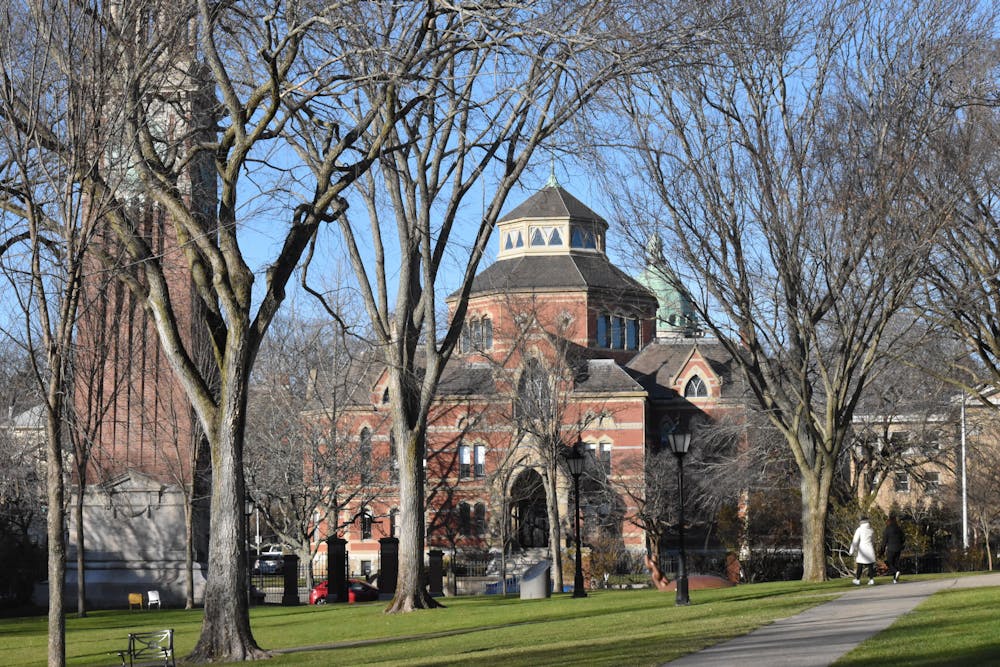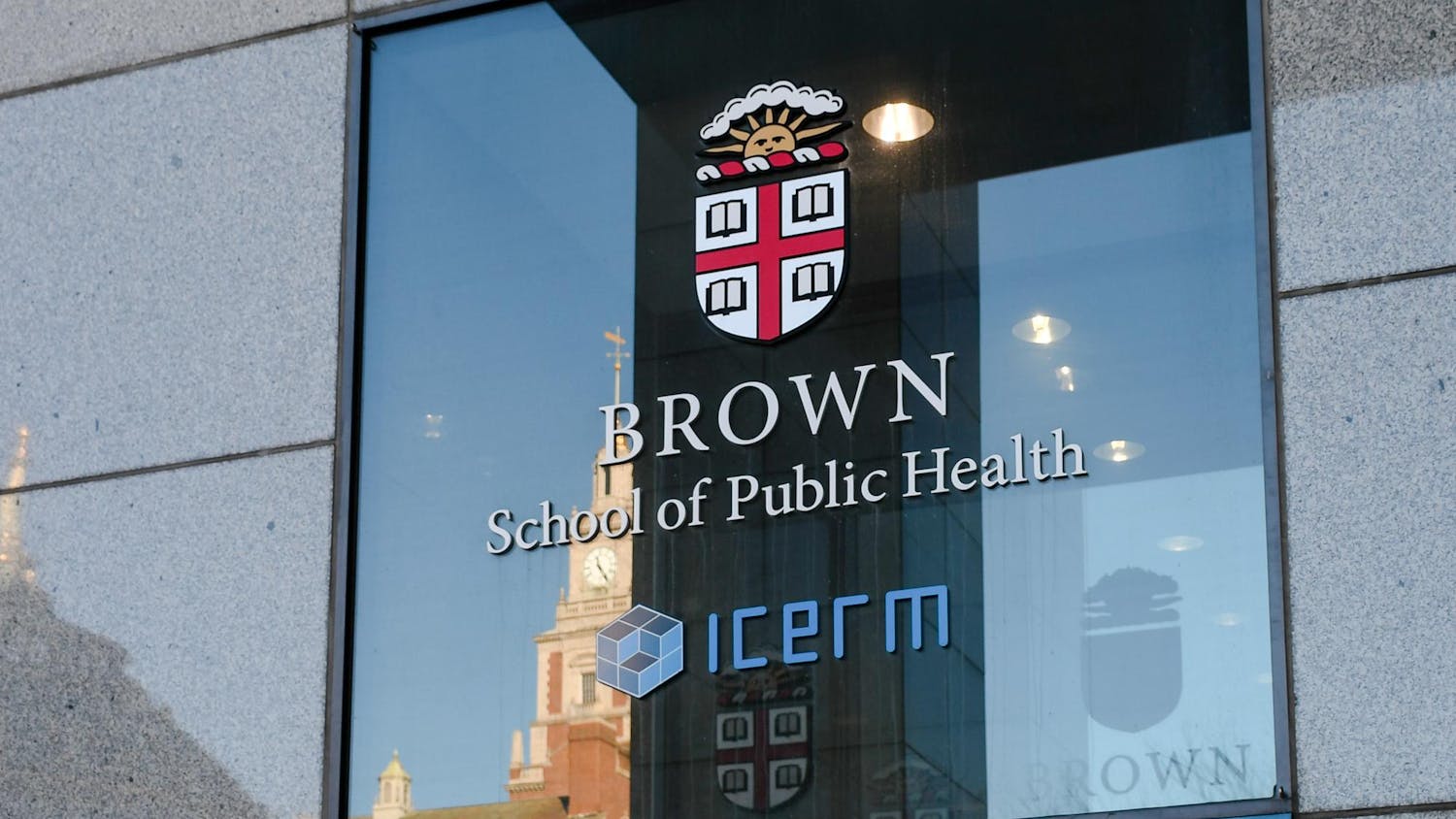The 2022 Research Achievement Awards were recently awarded to eight University researchers across multiple disciplines. Awardees will receive $5,000 in funding and be honored at the annual research celebration in the spring, according to the Office of the Vice President for Research.
The Research Achievement Awards were established in 2017 by the Office of the Vice President for Research to recognize the research achievements of Brown faculty, Jill Pipher, vice president for research, wrote in an email to The Herald. Since then, the office has honored six to eight faculty each year.
The office receives nominations from deans, department chairs, center directors and colleagues, in addition to self-nominations, Pipher continued. Nominations belong to two categories: Early Career Researcher Achievement and either Distinguished Researcher or Midcareer Researcher Achievement, which alternate each year.
A faculty committee with subject matter expertise completes an initial review of each nomination, and an advisory committee made up of the vice presidents for research and associate deans for research makes the final selections.
Pipher wrote that “the final selections of awardees is a difficult process, and especially in the category of ‘early career’ where we receive our largest number of nominations of truly excellent faculty.”
Margaret Bublitz, assistant professor of psychiatry and human behavior, assistant professor of medicine
Margaret Bublitz was awarded an Early Career Research Achievement Award. In addition to her work as a practicing clinical psychologist, Bublitz conducts research on maternal and infant health, she explained. She studies the impact that childhood maltreatment and other risk factors have on mothers through the pregnancy and postpartum period.
“Women who have been maltreated in their own childhoods are at increased risk to develop or have adverse outcomes of their pregnancy,” such as preterm birth and low birth weight, Bublitz said. How this biological stress response to maltreatment is activated in expecting mothers — often decades after the original trauma occurred — is what Bublitz is dedicated to uncovering.
In a recently published study, Bublitz and her group analyzed differences in brain response between mothers who underwent childhood maltreatment and those who didn’t while looking at newborns with different facial positions. In another study, they examined the experiences of mothers who experienced sexual abuse prior to pregnancy.
A new, recently funded project is focused on developing nonpharmacological interventions for women at risk of developing hypertensive disorders during pregnancy.
“I am so honored and really flattered” to receive the award, Bublitz said, emphasizing that she is grateful to her colleagues and mentors who have supported her throughout her career and nominated her for the award.
Brenda Rubenstein ’07, associate professor of chemistry
Associate Professor of Chemistry Brenda Rubenstein ’07 received an Early Career Research Award. Her lab conducts computational and theoretical science research to address “a wide range of problems throughout the physical and biological sciences,” including electronic structure in quantum theory and alternative computing technologies.
“For a long time, people have used computers to understand molecules, but we actually do the opposite. We want molecules to compute things for us,” Rubenstein said. Recently, the group found a way to store data by using the presence or absence of certain molecules to code a type of binary.
“That's one set of fun work that is great for theorists because it makes you really think about what theory is going to connect things that seem completely unrelated to each other,” Rubenstein said. Her group is also interested in predicting “interesting behaviors of materials … that only occur at the super small quantum level of electrons.”
Rubenstein added that her undergraduate experience at Brown has contributed to her success as a scientist. “I was able to take a wide range of science classes and mathematics classes and that was incredibly helpful,” she said. “Being able to understand lots of areas and to communicate among people who work in those different areas was incredibly important for me.”
“I'm very pleased to receive the award. But I do want to say that it's with the help of many others over the years,” she said. “It's really great to do science when you have collaborators who are fun people to work with, and who are optimistic and enthusiastic” about their work.
Tara Nummedal, professor of history, professor of Italian Studies
Tara Nummedal, a professor of history and Italian Studies, received a Midcareer Research Achievement Award for her research on the history of science, medicine and alchemy in early modern Europe.
In her 2019 book, “Anna Zieglerin and the Lion’s Blood: Alchemy and End Times in Reformation Germany,” Nummedal explores the intersection of gender, science and court policies in Reformation Europe.
Zieglerin “was a practitioner of alchemy who linked her ideas about alchemy very closely to ideas about the Reformation and the apocalypse and her own role in it, … particularly the role of her own body and reproductive capacities augmented through alchemy,” Nummedal said.
Recently, Nummedal co-published the first digital-native book under Brown’s Digital Publications Initiative, named “Furnace and Fugue: A Digital Edition of Michael Maier’s ‘Atalanta fugiens’ (1618) with Scholarly Commentary” in collaboration with Donna Bilak.
“It has text, of course, but it also has images and music scores,” she said. “The book itself is very alinear, and it's really meant to be kind of experimented with and read in different sorts of orders.” Readers can “choose their own adventure” via different methods of interacting with the work, whether that is listening to recordings of the music scores or reading the essays.
Nummedal is also starting a new project on affective magic, or “practices in 16th-, 17th- and 18th-century Europe that are designed to manipulate people's will and their affection.”
“It's really nice to be recognized by an institution that I've spent my whole career at,” she said, adding that she appreciates the University’s commitment to recognizing researchers in diverse fields. The funding “also offers research support that will help me as I move into this new book project on affective magic … and get back to the archives in Germany and in Europe.”
Andrew Zullo ScM '15 PhD '17, assistant professor of health services, policy and practice, assistant professor of epidemiology
Andrew Zullo, assistant professor of health services, policy and practice and, assistant professor of epidemiology, received an Early Career Research Achievement Award. Zullo’s research focuses on optimizing medication and vaccine use among older adults to improve their physical state, cognitive state and overall quality of life.
In a recent project, Zullo’s group looked at racial disparities in influenza vaccination between white and Black nursing home residents and found up to a 25% difference between white and Black residents.
“We find that in the same place, only 65% of Black nursing home residents may receive influenza vaccination while 90% of white residents may receive it,” Zullo wrote in an email to The Herald. “We believe that those findings support the conclusion that interventions and policies must be developed at the state and local geographic levels, not just federally, to meaningfully improve vaccine uptake and promote health equity.”
“I’m so incredibly grateful,” for the award, Zullo said. “All of my research is done with teams of people … more than anything else. I feel that the award reflects the sum of their hard work and important contributions to the shared research that we do together.”
David Badre, professor of cognitive, linguistic and psychological sciences
Professor of Cognitive, Linguistic and Psychological Sciences David Badre was awarded a Midcareer Research Achievement Award for his work on the neuroscience of cognitive control, or how the brain is able to plan and execute tasks.
Cognitive control is “a really hard thing to do, and humans are remarkably good at it,” Badre said. “Not just in the sense of being able to do almost any task we can think of, but (how) we can learn very quickly and we can follow instruction(s) for a task we've never done before.”
His lab is particularly interested in studying how the brain carries out hierarchical tasks, which involve completing mini-goals within an overarching one. “Imagine you're making coffee, for example. Moment to moment, you'll have little sub-goals that come up. … You'll grind your beans, turn on the drip machine, add water, turn on the machine, … but there's also an overarching plan to have a cup of coffee,” Badre said. How the brain manages that all at once “is a particularly interesting problem,” he added.
Badre’s lab has identified circuits between the neocortex and basal ganglia in the brain that allow people to carry out these hierarchical tasks. These circuits originally evolved from motor control circuits to control not only movement, but memories we use to guide our behavior.
“We've also been interested in how the brain organizes information,” Badre said. “Anything you're doing — even something really simple — requires you to take in lots of information from your senses (and) information from memory, and the brain has to have a way of integrating all of that.”
Regarding the Midcareer Research Achievement Award, Badre says that he is “very honored.”
“I've been lucky to work with great people in my lab over the years,” Badre said. “So I should say that this award is as much about them as it is me.”
Eric Nathan, associate professor of music
Associate Professor of Music Eric Nathan received a Early Career Research Achievement Award for his compositions for vocal and instrumental live performance.
In January, Nathan released a cycle of pieces named “Missing Words” inspired by Ben Schott’s book “Schottenfreude,” which proposes 120 new German words.
“These are words that describe everyday experiences that, in English, we have no synonyms for,” such as “Eisenbahnscheinbewegung, which is the feeling of movement you get when you're seated in a stationary train, and it feels like you're moving forward, but you’re not,” Nathan said.
A culmination of eight years of work, “Missing Words” “speaks about all these little moments that make up our life in some way. Some of them are humorous, others of them are sad or mournful or joyous or unusual,” Nathan explained.
“It's a great honor to have this work recognized by Brown … and also to have the opportunity to continue to support projects that are dream projects with the funding that the award provides,” Nathan said.
Hongjie Dong, professor of applied mathematics
Professor of Applied Mathematics Hongjie Dong received a Midcareer Research Achievement Award. Dong researches “regularity theory for both linear and nonlinear partial differential equations,” which “are used to mathematically formulate, and thus aid the solution of, … problems such as fluid flow, elasticity, electrostatics, electrodynamics, the propagation of heat or sound,” he wrote in an email to The Herald.
Previously, Dong made important contributions to the regularity theory for elliptic and parabolic partial differential equations, as well as the field of fluid dynamics. His lab is now studying elliptic equations that model composite materials, which contain two materials with different physical and chemical properties.
Dong wrote that he is “extremely delighted and honored,” to receive the Midcareer Research Achievement Award and thanked the University and Division of Applied Mathematics for “providing such a great work environment.”
“I am very grateful to my collaborators, colleagues and students for their encouragement, support and help throughout the years,” Dong added.
Gaurav Choudhary, professor of cardiology
Professor of Cardiology Gaurav Choudhary also received a Midcareer Research Achievement Award. Choudhary’s research focus is on pulmonary hypertension, a condition of elevated blood pressure in the lungs. His lab employs a variety of clinical, epidemiological and basic science techniques to study disease mechanisms and prevalence, as well as to explore diagnostic and therapeutic tools, Choudhary said.
Previously, his lab conducted research to show that a mean pulmonary artery pressure of 25 mmHg, the old cutoff for PH diagnosis, was in fact associated with negative outcomes. The definition of pulmonary hypertension has since been reduced from 25 mmHg to 20 mmHg. This way, physicians “can diagnose more people earlier rather than wait until (the condition) becomes more severe,” Choudhary said, allowing patients to receive treatment earlier.
His lab has also identified a non-neuronal pathway that can lead to fibrosis, or hardening, of the heart, with important implications for right ventricular dysfunction, a condition related to PH.
Choudhary will use the funding from the Research Achievement Award for several new projects.
“One of the biggest challenges in treating pulmonary hypertension is identifying patients,” he said. Finding high blood pressure in the lungs isn’t as easy as attaching a blood pressure cuff to the patient — screening involves looking for nonspecific symptoms, confirming via ultrasound of echocardiogram and finally doing an invasive right heart catheterization, he explained. According to Choudhary, a new study will develop AI technology and machine learning to more efficiently identify PH.
“I think it's an incredible honor,” Choudhary said. “I'm humbled to receive it. But you know, it's not really a Research Achievement Award for (just) me … it’s really recognition for everybody.”
Correction: A previous version of this story misspelled the name of Tara Nummedal and incorrectly said she received an Early Career Research Achievement Award rather than a Midcareer Research Achievement Award. A previous version of this article also incorrectly said Eric Nathan received a Midcareer award, when in fact he received an Early Career award. The Herald regrets the errors.





